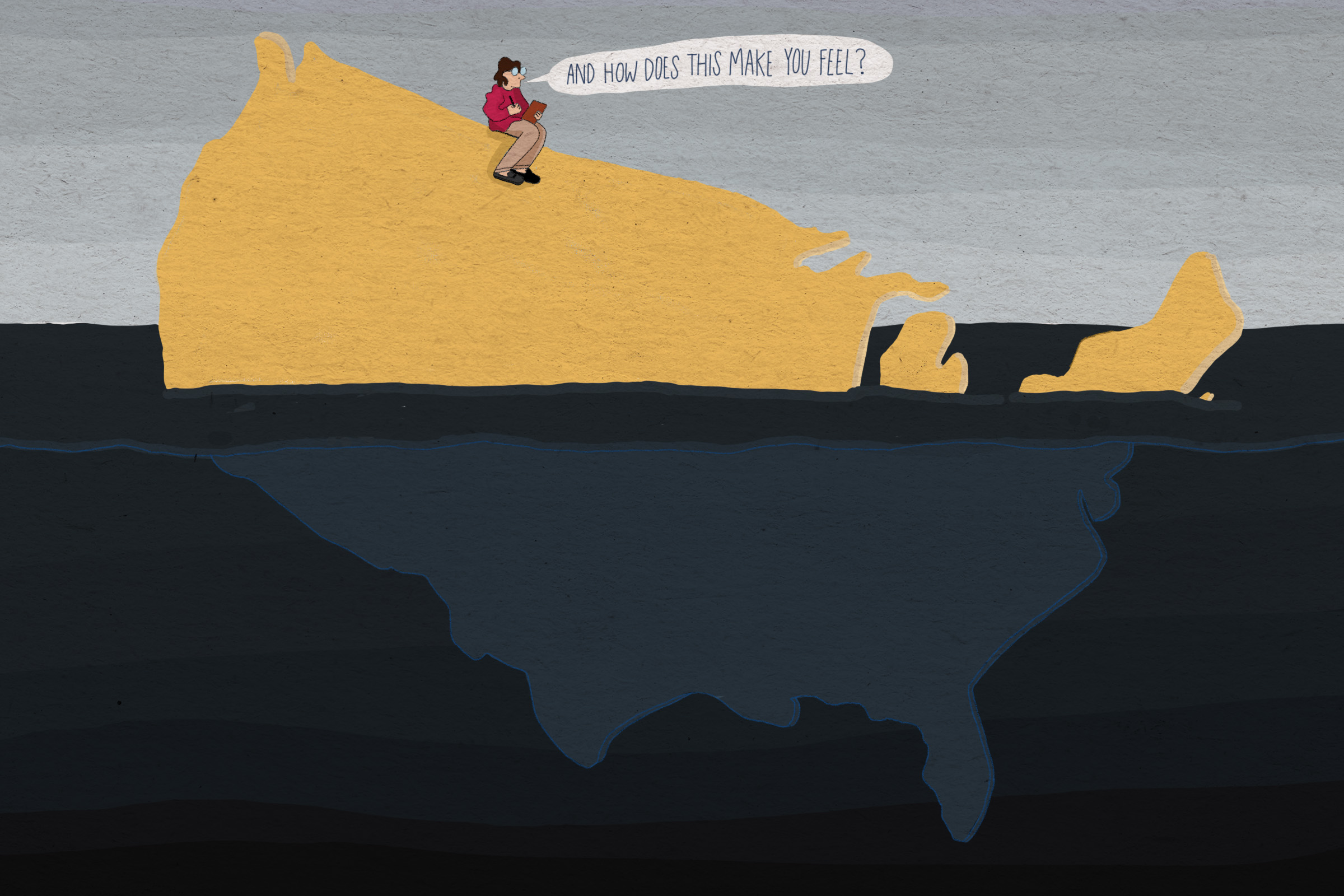
Enough of them can.
deleted by creator
So it turns you into a Red Guard? :o
C’mon now, we can’t ALL be drug dealers
It’s seldom covered in any decent capacity by most work or private health insurance unless you target it directly and lose out on other options.
Most offices are corner cutting so hard that the following week, you might have a new therapist/counselor that has no frame of reference beyond the former’s patient folder on you.
A lot of therapy is just a gotcha for Christian and religious bullshit.
Therapy and mental health is often seen as a sign of weakness for men, who often times never open up or seek help to begin with due to the stigma.
This isn’t a huge conundrum. It’s pretty easy to understand.
That and therapy is treating the symptoms but not the underlying cause. Therapy can help you heal, but when every week brings a new trauma you’re just treading water.
That and therapy is treating the symptoms but not the underlying cause.
As a therapist, I have to object and say that’s not good therapy. Even when the underlying cause is something external to yourself that you do not have control over, a competent therapist should be working with you on how you can minimize contact, manage contact better, or completely escape said external stressor. A complete fix may not be possible, but there’s usually room for improvement.
Regardless, it’s incorrect to say therapy treats symptoms, but not underlying cases. Underlying causes are focused on all the time.
Can you help me escape politicians who are taking away the ability for women to have safe abortions, attempt to overthrow the government, and their voters who brag about it by flying fascist flags on their cars? What about massive inflation without a similar rise in income that is needed just to survive?
Thanks in advance.
Yes this is snarky, but the stressors that most people are talking about in this thread are completely out of their control AND things they can’t just avoid.
Yeah, with the state of things right now, I’m not sure anxiety is so much a bug but a feature. The vast majority of the population is being exploited or ignored while a small group of people plunder the world’s resources and talents and continue to do so despite it obviously threatening the balance that life on this planet currently depends on. And different factions of those assholes use some of the population to try to take or protect what they have from others and have enough weaponry to devastate the entire population.
Even if it can be consciously ignored, the subconscious will figure it out and try to warn us and I think that denial is one of the big causes of mental health issues.
Can you help me escape politicians who are taking away the ability for women to have safe abortions, attempt to overthrow the government, and their voters who brag about it by flying fascist flags on their cars? What about massive inflation without a similar rise in income that is needed just to survive?
Nope, that’s going to take a lot of work to do anything about. What (imo) your therapist should be helping you do is develop strategies that let you deal with your anxieties. If therapy was only for dealing with things after the fact I don’t think I would be doing it because I agree with you, we can’t escape all the awful shit in the world but what we can do is make it not so debilitating that you can’t do anything.
So a therapist can help a woman in Texas get an abortion and overcome inflation?
Great to hear!
I’m confused, I thought I was pretty clear that therapy isn’t going to fix any of the societal issues that give you anxiety, it’s not supposed to…
The original point was that therapy doesn’t address the underlying problem. It led to the post above:
If therapy was only for dealing with things after the fact I don’t think I would be doing it because I agree with you, we can’t escape all the awful shit in the world but what we can do is make it not so debilitating that you can’t do anything.
Which doesn’t address the underlying issues or solve anything when it comes to actual problems that directly impact people. It is also worded as if the therapy helps by avoiding the awful shit so someone can do something. Which probably means not letting stress about one thing keep you from doing something else you can control, but in the context of the comment it was replying to could be read as doing something about the examples.
Therapy is great for addressing personal issues such as anxiety and trauma that are keeping someone from successfully acting on things they do have control over. But when it comes to things people can’t control it is just a coping mechanism that doesn’t solve the underlying problems that someone is reasonably responding to with frustration and helplessness. Yet it keeps being suggested as a solution.
Something that has always helped me with things like this (I’m trans in the uk, and have various other things around decentralised networks and such, also the economy and like 5000 other things, personal situations, etc.) is doing concrete steps towards my socio-techno-politico-economic goals and personal stuff.
Things like organising with other people (not just for protests/riots, but also things like underground services, discreet information leaflets, and just general community), trying to develop new tech, etc. ^.^
Decent therapy can help at least with dealing with some of the effects of this stuff, and manage interpersonal causes of mental health issues, in theory, if you can access it - though there are many issues imo with certain types of therapy that promote accepting shitty sociopolitical situations and personal situations, though this seems to be more of a philosophy thing than really therapy related specifically.
Techniques for managing the effects of poor sociopolitical situations - and working with someone to come up with more strategies to deal with these effects as well as avoid more common self-destructive thought patterns - might help you act more towards fighting the root causes even if it can’t solve them itself ^.^
For people in these situations, if you want someone else to help come up with personal coping strategies and to practise identifying more destructive thought patterns and manage emotional states, my opinion is that this is where a good therapist may be helpful if you can access one and want one.
For solving the more underlying issues? They probably can’t help directly, but they may help you gain more ability/mental bandwidth to deal with them either personally or via organising and political strategy. However this is all very conditional on therapist quality and some therapists may be actively harmful.
At least, this is my view. I have a pretty complex set of thoughts about therapy and mental health systems - and am familiar with the ways they can be used as weapons against individuals and larger groups as a trans and autistic person, as well as how they can be helpful - but hopefully the stuff about acting to do political things is useful to someone.
Actually doing something rather than just watching things get worse is helpful for me personally at least ^.^
If I was your therapist, while I couldn’t change the world for you, I could certainly help you change how you’re thinking about all of this political shit to reduce your stress and distress. Most of us have political misgivings, but only some of us have those misgivings create serious problems in our lives. I’m obviously sympathetic to—for example—women who can’t get abortions in their state, but therapy is about coping with reality, not changing reality in ways that correspond to wishful thinking.
I think the issue being remarked on is while yes therapy helps one better manage and attempt to do everything within an individual’s power to react to something (include minimizing contact) there are enough stressors beyond people’s individual locus of control that no matter how personally resilient one becomes misery is still a natural outcome. Therapy attempts to address underlying causes… But ultimately it still places the burden of fortitude on the person. If the situation merits more fortitude than person is capable of even at their best then the solution lies beyond that individual’s training to respond to it and must be addressed at the source. Hence the phrase “Treats symptoms, not the cause” is catch-phrasy and not by all means technically correct, but encapsulates this frustration at having to constantly be the one expected to exert constant personal effort to be okay while the source problems, which are often cultural/social in nature, are treated as immovable constants and continue being a source of inhumane conditions.
Therapy can help you heal, but when every week brings a new trauma you’re just treading water.
Damn, that’s… depressingly poignant
Ok but therapy doesn’t have to be a “crisis of the week” situation. A person and their therapist should be working together toward a set of goals that aim to address their needs (e.g. getting enough self-esteem, confidence, new perspectives, etc. to treat the cause (e.g. quit abusive job, leave a partner, make boundaries with crazy family, etc…). Good therapists identify when therapy is drifting outside of effective modalities and guide the sessions back to the overall goals.
Signed, a person who is in “crisis of the week” therapy but is also terrible at confrontation and is working toward bringing it up.
That and mental health awareness becoming more prevalent means that more people are becoming aware of mental health issues
Spoken like someone who’s never been in therapy.
Yes
My therapist asked me about what stresses me out the most. I said “rent doubled”. She said, “Yeah there’s no therapy for that.” Then we chuckled and sighed deeply while we looked for something more lighthearted to talk about, like my father’s disappointment at me.
deleted by creator
I am shocked that a market based healthcare system that prioritizes profits manages to lock people into lucrative consumer cycles where they’re conditioned to rely on medications or treatments that don’t cure them. I am shocked.
Completely unrelated, it’s very noticeable how everyone is medicated and has mental health problems since I’ve moved to the US, weirdly back in Australia where the health system is different it’s less common. What are the odds of that…
As it turns out, stress actually increases if people have to trade their savings for mental health services
So it’s that the treatment is intentionally ineffective?
It’s not that the US is a worse place to live?
Oi cunt. Strallya!
Without reading the article I’m gonna guess that it’s because work, politics and culture have got you all so permanently stressed and anxious that you turn on each at the slightest upset like sharks scenting blood.
We live in a world that rewards narcissistic asshole behavior and nothing else. It’s fucking depressing no amount of therapy will change that.
But some drugs might help you change your brain chemistry to be as narcissistic or just so singular focused that you can’t think about being depressed because you are focused on repetitive task work.
And isn’t that the fix that we all need?
Alternate reading of the headline: “We’re using more bandages than ever- why are people still getting cuts?”
If your boat is on fire. And has been for a while. And you start throwing water on it - but at the same time someones at the top of the boat are actively throwing gasoline everywhere - you aren’t going to put out the fire.
Is our mental health getting worse, or are we more aware of mental health issues? The article mentions how more people seek therapy now than 20 years ago and how more people are reporting their mental health as not good. However, I wonder how many people back then had mental health issues that they suffered in silence with. There used to be more of a stigma with having mental health disorders which led to people not seeking treatments (which of course led to less diagnoses). Someone with anxiety or depression would live with it or chalk it up to a character flaw or might think that what they’re dealing with was what everyone dealt with, but they probably wouldn’t seek therapy or tell anyone that their mental health is poor. So I do think that part of it is people acknowledging their struggles with mental health more now than ever.
It’s the same thing with more lgbqt+ people. They’ve always existed, but since it’s more and more acceptable to come out more people are comfortable than ever before, despite the right screaming that kids are being “indoctrinated”.
I think this is a big factor in the uptick of MH cases being reported. It’s more okay to seek out help, so it gets reported more. The cases were still there 20 years ago.
When the military started to crack down on sexual assault and made it more “friendly” to report being a victim the number of cases reported went up. The cases where always there. Now we have a better idea of what we didn’t know before.
It’s an interesting article and worth a full read. But I’ll bullet point the main problems with mental healthcare it describes (based on my comprehension of the article):
- Over and misdiagnosis - since mental health disorders are based on symptoms which often overlap with other conditions, misdiagnosis is common. Also, diagnosis is inherently subjective and depends on the therapists impressions and the quality of information the patient gives
- Therapy itself doesn’t work for everyone, and when it does it often takes a lot of time. People expect to head into one or two therapy sessions and have all their problems solved. Also, some forms of therapy have less evidence of effectiveness.
- Since therapy is hard, time consuming, and costly, therapists often resort to prescribing meds. Antidepressants in particular are far less effective than people perceive. At best antidepressants can slightly help improve your mood, but the hard work of therapy is needed to address the underlying issues, which often doesn’t happen.
- What often has the biggest benefits are strategies that help people manage the stressors, habits, and circumstances of their lives. Traditional therapy often isn’t geared toward that, and there is only so much any therapy can do because…
- A lot of our mental health is based on societal factors and our circumstances, and you can’t just talk your way out living with all of this gestures vaguely at everything
- The rise of app based mental healthcare is good in that it expanda access, but the quality is shit.
and you can’t just talk your way out living with all of this gestures vaguely at everything
Chad analysis
The rise of app based mental healthcare is good in that it expanda access, but the quality is shit.
Careful peeps, they leak data too… which could cause a lot of mental health stressors. So got to keep that in mind when dealing unreliable tech merchants or really any of them.
It seems to me there is a very simple answer to the issue pointed out in the article—mental health problems are out of control, and no matter how many therapists and doctors we employ to combat it, there’s just no stopping it.
I’ll choose “every politician is a lying grifter” for $500, Alex.
Someone please correct me if I’m wrong because I have trouble understanding this. But someone told me the other day that I’m the height of the Great Depression,1931(?), that the average American was making 88k in todays dollar.
Today the average American is making 33k. Is this true?
If this is true that would totally explain the amount of mental illness on top of climate change concerns. If it is true I don’t know why more people wouldn’t be talking about it
A lot of those claims are based on tax return numbers, which radically overestimate the average salary back then because only the richest people actually filed taxes during that time.
Don’t get me wrong, we’re not in a good place, but it’s not peak great depression bad.
No bread lines where I live, yet.
There are bread lines where I live. The homeless/houseless population is absurd.
I dunno. Seeing quasi hoovervilles popping up with communities of homeless people living in tents and I don’t even live in California. We are like 80% of the way to great depression but there is just more large scale manufacturing of food and entertainment these days
Idk anything about that, but I have heard that the wealth disparity is worse than pre-revolution France
As far as a percentage of your annual income goes, during the Great Depression houses were cheaper than they are today.
Shit, buying a house then was cheaper than RENTING today.
Can’t comment on 88K figure
But for current times… 33k is a bit to low. I think official stats is that wage is 39K for all working adults. and closer to 50k for full time working adults. these are median, not averages. ie 50% makes less, 50% make more.
I make 31k so try again.
You are below median. Here are some data on U.S. median personal income over time.
Every aspect of life demands 110% from us at all times.
We are all having to clean an entire house, cook every meal, pay huge mortgages or rents, pay loans, daycare costs, and insurance…for what? We’ve removed all economies of scale for ourselves, and made it to where it’s easier to spend the cash to have someone else do it. They then get the economies of scale that we used to have when we lived with extended family and didn’t have to pay for every basic service multiple times.
It’s exhausting, and there’s no slack left in the system. You can’t cut back on much to make the rest float, because everything is the maximum cost it can be for even the shitty versions, and prices on everything go up continually with no real raises available for the vast majority.
We are one major catastrophe away from huge swaths of our population becoming migrant refugees to other states.
We’ve removed all redundancy and forgot that it’s synonym is resiliency. We are absolutely fucked, it’s just a matter of counting the time before the house of cards collapses.
Absolutely correct with all of this.














